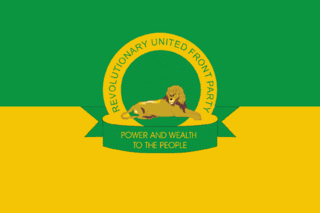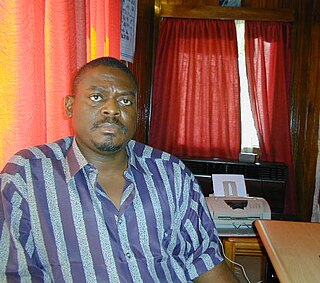Related Research Articles

Sierra Leone, officially the Republic of Sierra Leone, informally Salone, is a country on the southwest coast of West Africa. It is bordered by Liberia to the southeast and Guinea to the northeast. Sierra Leone has a tropical climate with a diverse environment ranging from savanna to rainforests, a total area of 71,740 km2 (27,699 sq mi) and a population of 7,092,113 as of the 2015 census. The capital and largest city is Freetown. The country is divided into five administrative regions which are subdivided into sixteen districts. Sierra Leone is a constitutional republic with a unicameral parliament and a directly elected president. Sierra Leone is a Muslim majority country at approximately 78%, though with a politically influential Christian minority at about 21%. Muslims and Christians interact very well together and religious violence is extremely rare in the country. All the major Muslim and Christian holidays a officially national holidays in the country.

Charles McArthur Ghankay Taylor is a former Liberian politician and convicted war criminal who served as the 22nd President of Liberia from 2 August 1997 until his resignation on 11 August 2003, due to the Second Liberian Civil War and growing international pressure.

Foday Saybana Sankoh was the founder of the Sierra Leone rebel group Revolutionary United Front (RUF), which was supported by Charles Taylor-led NPFL in the 11-year-long Sierra Leone Civil War, starting in 1991 and ending in 2002. An estimated 50,000 people were killed during the war, and over 500,000 people were displaced in neighboring countries.

The Revolutionary United Front (RUF) was a rebel army that fought a failed eleven-year war in Sierra Leone, starting in 1991 and ending in 2002. It later developed into a political party, which still exists today. The three most senior surviving leaders, Issa Sesay, Morris Kallon and Augustine Gbao, were convicted in February 2009 of war crimes and crimes against humanity.

Major Johnny Paul Koroma was the head of state of Sierra Leone from May 1997 to February 1998. His alleged death has not been proven as nobody has found his body, hence he cannot be legally deemed to be dead. He was involved in criminal activities such as heavy drug trafficking.

The Armed Forces Revolutionary Council (AFRC) was a group of Sierra Leone soldiers that allied itself with the rebel Revolutionary United Front in the late 1990s. While the AFRC briefly controlled the country in 1998, it was driven from the capital by a coalition of West African troops. It was no longer a coherent and effective organization by the elections of 2002.

The Sierra Leone Civil War (1991–2002) was a civil war in Sierra Leone that began on 23 March 1991 when the Revolutionary United Front (RUF), with support from the special forces of Charles Taylor’s National Patriotic Front of Liberia (NPFL), intervened in Sierra Leone in an attempt to overthrow the Joseph Momoh government. The resulting civil war lasted 11 years, enveloped the country, and left over 50,000 dead.

Samuel Hinga Norman was a Sierra Leonean politician from the Mende tribe. He was the founder and leader of the Civil Defence Forces, commonly known as the Kamajors. The Kamajors supported the government of Ahmed Tejan Kabbah against the Revolutionary United Front(RUF), which was led by Foday Sankoh. On 7 March 2003 Hinga Norman was indicted by the Special Court for Sierra Leone for war crimes and crimes against humanity. He died on 22 February 2007 in Dakar, Senegal while undergoing medical treatment.

The Kamajors were a group of traditional hunters from the Mende ethnic group in the south and east of Sierra Leone. The word "Kamajor" derived from Mende "kama soh", meaning traditional hunter with mystical powers, who were originally employed by local chiefs.

The Abidjan Peace Accord was a treaty signed in Abidjan, Côte d'Ivoire on 30 November 1996 to try to bring an end to the Sierra Leone Civil War (1991–2002). The two main signatories were President Ahmad Tejan Kabbah of Sierra Leone and Foday Sankoh, leader of the Revolutionary United Front (RUF) rebel group. However, Sankoh refused to honour the terms of the agreement, and Kabbah was forced into exile by a May 1997 military coup, so the Accord failed to bring about peace.

The Special Court for Sierra Leone, or the "Special Court" (SCSL), also called the Sierra Leone Tribunal, was a judicial body set up by the government of Sierra Leone and the United Nations to "prosecute persons who bear the greatest responsibility for serious violations of international humanitarian law and Sierra Leonean law" committed in Sierra Leone after 30 November 1996 and during the Sierra Leone Civil War. The court's working language was English. The court listed offices in Freetown, The Hague, and New York City.
The Civil Defense Forces (CDF) was a paramilitary organization that fought in the Sierra Leone Civil War (1991–2002). It supported the elected government of Ahmed Tejan Kabbah against the rebel groups Revolutionary United Front (RUF) and Armed Forces Revolutionary Council (AFRC). Much of the CDF was made up of the Kamajors group, which is part of the larger Mende ethnic group. The Kamajors believed in many magical ways of defending themselves, such as rituals to create bulletproof skin.
Articles related to Sierra Leone include:
Issa Hassan Sesay served as senior military officer and commander in the Revolutionary United Front and AFRC/RUF forces in their insurrection against the government of Sierra Leone. He was said to be subordinate only to Sam Bockarie, the Battlefield Commander, and Johnny Paul Koroma, leader of the AFRC.
Alex Tamba Brima, also known as Gullit, was a Sierra Leonean military commander. He was one of a group of seventeen soldiers in the Sierra Leone Armed Forces who called themselves Armed Forces Revolutionary Council (AFRC) that successfully staged a coup that ousted president Ahmad Tejan Kabbah in May 1997. On 19 July 2007 he was convicted and sentenced to 50 years in prison for committing war crimes and crimes against humanity during the Sierra Leone Civil War.
Ibrahim ("Brima") Bazzy Kamara was a commander of the soldiers of the Sierra Leonean Armed Forces Revolutionary Council (AFRC) and in 2007 was convicted of committing war crimes and crimes against humanity in the Sierra Leone Civil War.
Santigie Borbor Kanu was a Sierra Leonean military commander in the Armed Forces Revolutionary Council (AFRC). He was one of a group of seventeen soldiers in the military of Sierra Leone who successfully staged a coup that ousted president Ahmad Tejan Kabbah in May 1997. In 2007, Kanu was convicted of committing war crimes and crimes against humanity in the Sierra Leone Civil War.
Augustine Gbao, also spelled as Augustine Bao, is a former paramilitary commander of the Revolutionary United Front (RUF) in the Sierra Leone Civil War. In February 2009, he was convicted of war crimes and crimes against humanity by the Special Court for Sierra Leone and sentenced to 25 years in prison. He was a senior commander in the RUF from 1991 until his capture in 2002.

United Nations Security Council resolution 1346, adopted unanimously on 30 March 2001, after recalling previous resolutions on the situation in Sierra Leone, the Council extended the mandate of the United Nations Mission in Sierra Leone (UNAMSIL) for a further six months and increased the size of its military component.

United Nations Security Council resolution 1400, adopted unanimously on 28 March 2002, after recalling all previous resolutions on the situation in Sierra Leone, the Council extended the mandate of the United Nations Mission in Sierra Leone (UNAMSIL) for a further six months until 30 September 2002 in the run up to the May 2002 general elections.
References
- ↑ "Memorandum for: Confirming Judge, Special Court for Sierra Leone" (PDF). Residual Special Court for Sierra Leone. Retrieved 23 May 2017.